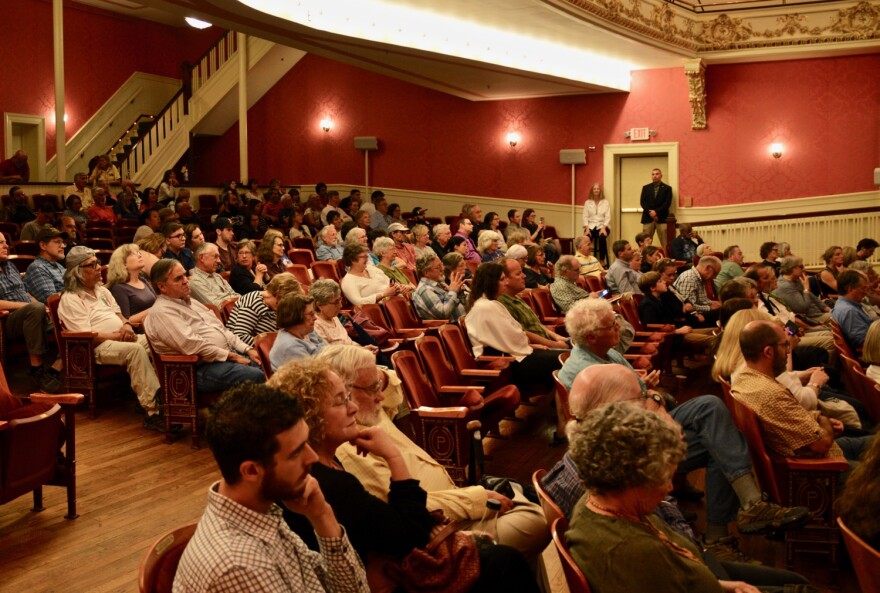Vermont’s two major party gubernatorial candidates debated for the second time Wednesday night. This time they faced off in Rutland at an event hosted by VTDigger.
About 200 people came to Rutland’s Paramount Theatre to see incumbent Republican Gov. Phil Scott and Democratic challenger Christine Hallquist spar on everything from raising the minimum wage — which Hallquist supports and Scott opposes — to improving broadband, from fighting opioids to small school consolidation.
When moderator Mark Johnson, of VTDigger, asked Scott whether there was any circumstance where he could support a carbon tax, Scott provided a single-word answer: “No.” The response drew applause.
But Hallquist pounced on Scott's answer.
“I would never write anything off the table without taking a deep dive and looking into it ... That’s political rhetoric, making pledges that you’re not going to look at innovative solutions,” Hallquist said.
When pressed by Johnson to elaborate on his one-word answer, Scott said he felt a carbon tax would be especially hard on low-income rural Vermonters who live outside Chittenden County.
“They can’t afford always to buy something different to either heat their home or to drive a zero-emission vehicle. ... They just can’t afford to buy that," said Scott. "And they have to travel longer distances than they do in other highly populated areas, so this would be a very regressive tax.”
Both candidates stressed they want to ensure Vermont remains affordable. But their approaches differ on how best to do that while promoting economic growth, especially in rural parts of the state.
Scott talked repeatedly of the need to hold down costs to fight rising property taxes, while Hallquist said raising the minimum wage and boosting broadband access would do more.

Another issue that divides the candidates is how best to expand and improve health care.
“When you talk about Medicare for all in this state, … just this state doing it? We went through 5 years of torture on that," said Scott, shaking his head. "We've seen that movie.”
He argued businesses and the state’s economy suffered greatly when his predecessor, Peter Shumlin, tried and failed to create a single-payer health care system in Vermont.
Scott said a patient-centered payment model that the state is now experimenting with makes more sense and is working.
“If you want single payer in Vermont, don’t vote for me," added Scott.
Hallquist countered: “So I hear more of the same, let’s wait for someone else to take action.”
“We’re taking action,” Scott argued, “I just told you.”
“No, no, I’m talking about Medicare for all,” Hallquist shot back.
She argued other countries are providing comprehensive health care at a fraction of what the U.S. spends, and Vermont should be following their lead.
“If you don’t have a leader who’s working to get to Medicare for all, you should fire them and get one that will. Because – and we’re not going to do that overnight,” admitted Hallquist to the audience, “but that’s our job. You as a public, you as a voter demand health care for all, because this system is failing.”
More from VPR — Hallquist And Scott Support Long-Term Clean Water Plan, But Neither Details Funding Source [Oct. 9]
Both candidates touted their business, cost-cutting and management skills. Scott highlighted his track record of adding no new taxes or fees to the general fund budget, while Hallquist pointed out she was able to reduce costs and improve service when she was CEO of Vermont Electric Cooperative.
One thing those at the Paramount did not hear was input from independent candidate Charles Laramie. He and a small group of protestors marched outside the theater and briefly interrupted the debate to argue all candidates in the upcoming governor's race should have been included.
Scott and Hallquist will participate in the VPR - Vermont PBS Debate on Oct. 24 at 7 p.m.





